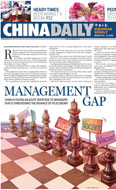View
GPS technology an imposition or an improved position?
Updated: 2011-03-09 08:01
(China Daily)
 |
Beijing brings out the Big Brother in Western media. For instance, a recent report in The Guardian led with the line, "Human rights activists believe the Chinese government is exploiting mobile technology to control unrest."
My first thought was, what unrest? Then, slightly less glib, what government doesn't exploit technology to keep tabs on its population? The story was based on a benign Beijing Daily article saying a scheme was being implemented that could track the movement of individuals using global positioning technology and thereby improve traffic.
The deputy director of the Beijing municipal science and technology commission was quoted as saying the system would be used to deal with congestion by collecting data on the movement of people.
If The Guardian writer went on a walkabout in the capital city, she would no doubt realize what good sense this makes. The traffic is appalling. According to a 2010 IBM survey it is the world's top spot for "commuter pain" and 69 percent of Beijing motorists have, on occasion, just given up and gone home. I occasionally do this on weekends when the traffic is, amazingly, worse than during the week.
But, I digress. My point is, I thought phone tracking had moved on from the realm of science fiction a long time ago. I was of the opinion that unless I took the battery out of my phone I could be tracked down by anyone who had the appropriate device. Certainly, in Britain, the police have been doing this for years.
In Europe, by law, a mobile phone company is obliged to keep a user's phone records for a year and must hand them over to the authorities on demand. Simply put, if they want to know where you are, they only have to ask.
As to commercial applications of the technology, shopping centers in the United Kingdom routinely triangulate mobile phones to process data on the movements of shoppers around the center and determine how many stores they visit.
Foursquare does much the same for fun. A location-based social networking service in the United States and other countries, it harnesses the GPS capabilities of phones so that users can check in and let their friends, and the whole world, know where they are. The local variant of this service is Jiepang, which Foursquare is considering buying or partnering.
Also, just announced, the micro-blogging behemoth Sina Weibo is rolling out a similar service called Weilingdi, or "micro territory", that highlights where you are and encourages its VIP clients to tell followers where they go, such as restaurants and clubs. Naturally, it integrates with Weibo and looks set to dominate the market. It's an advertising goldmine, after all.
Obviously, we're not shy about telling people where we are, or that worried about who knows. Rather, it looks like we accept it. Even enjoy it.
This is not to say piffle to privacy concerns, these are real, but social networking has dissolved many of the boundaries. Having an avatar, not the real me, just the me I put out there, is one way of enjoying such services without putting my life on the line. VPNs, blocking devices are two more. Not signing up is another.
As for governments getting in on the act, surely it would be more surprising if they didn't. And if GPS technology does improve traffic, I'm all for it.
E-paper

Rise and shine
The Chinese solar energy industry is heating up following recent setbacks in the nuclear sector
Preview of the coming issue
Bombs aim for regime change
CSI, with a twist
Specials

Donkey-powered Land Rover
Two donkeys pull a broken-down Land Rover in Shenyang, Liaoning province.

China Fashion Week
Models present creations for the Hosa Swimwear Trend Press Conference 2011.

Peony express
Growers of china's unofficial national flower are reaching out to europe for help
